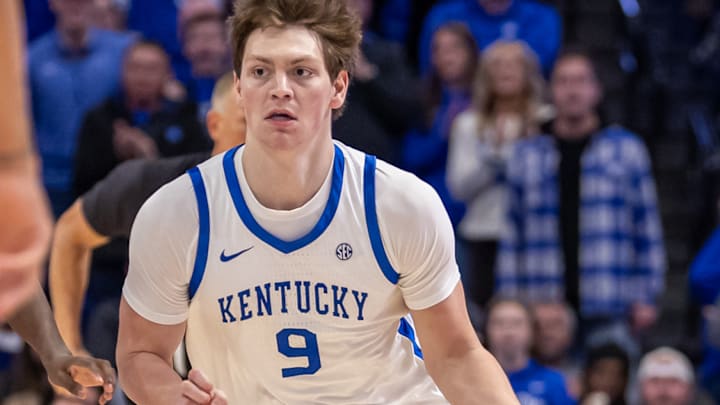There’s a number stitched into Trent Noah’s jersey—bold, blue, unassuming. It’s the number 9. A single digit, easily overlooked, unless you know the weight it carries.
Noah, a proud son of the Commonwealth, wasn’t always destined to play at Kentucky. The four-star forward from Harlan County had given his word to South Carolina and head coach Lamont Paris. But fate—like it so often does in Kentucky—changed with the winds of spring. John Calipari left for Arkansas. Mark Pope came home. And when Pope called, Noah listened. This time, it wasn’t about recruiting pitches or rosters. It was about belonging.
The moment Noah slipped on the Kentucky blue, Rupp Arena roared—not for a prodigy or a prodigal son, but for something quieter and more personal. For Eastern Kentucky, it felt like being seen. He was one of their own, in a jersey that symbolized hope as much as it did heritage.

But the jersey held more than that.
It had been more than 80 years since anyone wore the number 9 for Kentucky basketball. The last to do so was a quiet, disciplined young man from Campbellsburg, Kentucky. His name was Kenneth England.
England played three seasons under the legendary Adolph Rupp in the early 1940s. A team-first player, his best year came in 1941-42—117 points in 24 games. But before he could finish his time in Lexington, the world asked something far greater of him.
Like so many of his generation, Kenneth England left hardwood for battlefield. He joined the U.S. Army and became a captain in the 10th Mountain Division—the only American ski troop. By December 1944, he was in Italy, leading men into the freezing mountains. He helped liberate Mt. Belvedere from Nazi control. His leadership earned him the Bronze Star.
Then came April 14, 1945.
Captain England was fatally wounded while leading his men across a minefield in northern Italy. Even as he lay dying, he insisted his morphine be given to the others. For his gallantry, he was posthumously awarded the Silver Star.
A field in Italy was named in his honor. A star lines the wall in Memorial Coliseum in Lexington. But for decades, his jersey number remained untouched.
Until now.
When Kentucky unveiled the newly renovated Memorial Coliseum this April—a place dedicated to honoring over 10,000 Kentuckians who served in the military—one gold star stood quietly among the hundreds. It bears the name Kenneth England. It tells his story without fanfare. But those who know, remember.
“This is the first year since 1943 that anyone has worn his number,” said Margina Grow, a family member of England, to LEX18. “So we’ve been cheering for Trent Noah.”

They don’t cheer because Noah is a future lottery pick or a scoring machine. They cheer because a boy from Harlan County is now carrying the story of a soldier from Campbellsburg. They cheer because Kentucky, in its most sacred places, remembers its sons.
When Trent Noah takes the court next season, there will be more stats, wins and losses, shots taken and some missed. There will be screens, rebounds, and maybe the occasional three that brings Rupp to its feet.
But there will also be something else. Something deeper.
Each time Noah plays, he carries more than expectations. He carries honor. He carries memory. He carries a jersey that went unworn for 80 years.
And stitched across his chest is a number—just one digit—that now tells two stories.
One of a Kentucky kid chasing dreams.
And another of a Kentucky hero who gave everything.
